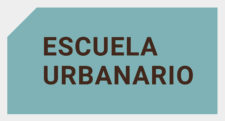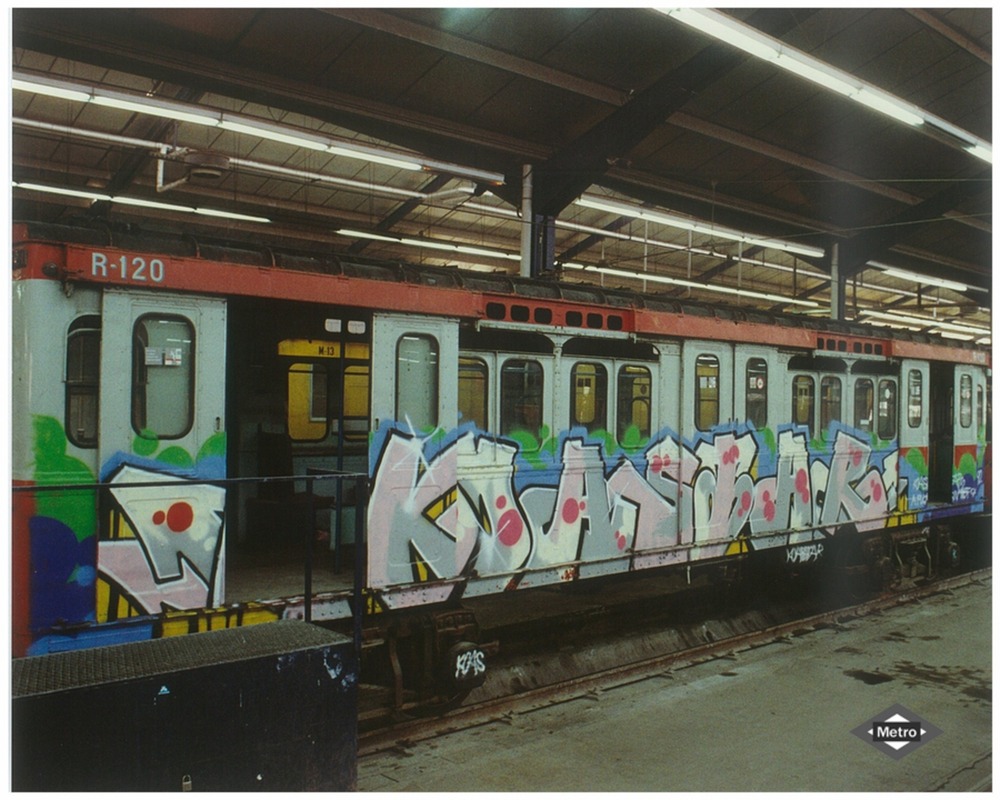About the teacher

Javier Abarca (Madrid 1973) is one of the leading thinkers in the field of graffiti and street art. A key artist in the first generation of Spanish graffiti, he taught a pioneering 4-month course on these topics at the Complutense University of Madrid between 2006 and 2015. He works internationally as an educator, researcher and author.
After teaching widely for 15 years, Abarca founded the Urbanario School, an online academy for advanced education about graffiti, street art and related topics. Since 2008 he has run the website Urbanario, the essential source for graffiti and street art research in the Spanish language. He is also the founder and director of the groundbreaking events Unlock Book Fair and Tag Conference. Detailed CV at javierabarca.es/en/bio.
In the late 80’s Abarca took part in the punk-originated, vernacular graffiti scene of the Madrilenian ‘flecheros’. By the start of the 90’s he was leading the flourishing local subway graffiti scene, and networking throughout Europe in the first Interrail forays by Spanish writers. He has been a privileged witness of the international street art scene since its budding stage in the 90’s, and a close accomplice of key artists.
Abarca’s early academic work laid the foundations of the field of graffiti and street art research in the Spanish language. His milestone PhD is regularly quoted in papers on these topics, its PDF version has been downloaded over 20.000 times from the online repository of the Complutense University of Madrid.
In 2006, at 32 years old, Abarca was commissioned to design and teach a 4-month class about graffiti and street art for the Complutense University of Madrid. It was the first of its kind, and the only one for years. Its program included private Spanish premieres of milestone documentaries, unpublished artist videos, and visits of key local artists. Half of the teaching time was devoted to one-to-one mentoring sessions in which the students developed site-specific outdoor intervention projects, see selection here.
After a continuous decade of teaching that class, Abarca left his position to focus on his own projects. He has stayed an influential presence in the specialised academic field, and his conceptual contributions have become turning points in the European discourse. He talks regularly at specialised events, and was founding member of the scientific committees of the pioneering Urban Creativity Conference (Lisbon), SAUC Journal (Lisbon), Nuart Journal (Norway) and Menetekel.org (Berlin).
He is the founder and director of two groundbreaking and central events in the international research scene. The Unlock Book Fair (started in 2016), the unmissable meeting and showcase of the specialised publishing scene, and the Tag Conference (started in 2017), an event where academic and independent researchers share their findings about tagging of all eras.
The Unlock Book Fair and the Tag Conference are travelling events. They have taken place in Barcelona, Berlin, Amsterdam, Cologne, Modena, Herne (Germany), Besançon (France) and Groningen (The Netherlands). Offshot events have traveled to sixteen cities in Europe and America, among them Moscow, London, Lisbon, Vienna, Manchester, Kassel, Madrid, Monterrey and Mexico City.
Abarca is also the editor and publisher of unprecedented books about obscure chapters of graffiti and street art history, such as hobo graffiti from the late 19th and early 20th centuries, and the punk-originated European graffiti scenes of the 70’s and 80’s.
In his forays into curatorship Abarca has worked with some of the most forward-thinking artists in the scene, among them Eltono, MOMO, Escif, Adam, Akay, Wermke–Leinkauf and Mathieu Tremblin. In 2012 he co-curated Eltono’s “Deambular”, the first solo exhibition in a Spanish museum by an artist coming from the street art scene. He has been commissioned to design and present seminars, roundtables and screening sessions by various institutions.
Through his 15 years of teaching experience Abarca has worked in courses, workshops, lectures and mentoring with hundreds of students from all backgrounds, by commission of universities, museums, institutions and independent spaces. Among them:
Biennale di Venezia, Central Saint Martins School of Arts, ICA (London), Bristol Museum, ARCO (Madrid), Freie Universität (Berlin), Escuela Nacional de Restauración y Museografía de México, Menéndez Pelayo International University, University of Lisbon, University of Cologne, Lund University (Sweden), Institut Supérieur des Beaux Arts de Besançon (France), Université Nice Sophia Antipolis (Nice), University of Lodz (Poland), University of the Basque Country, Autonomous University of Madrid, Polytechnic University of Valencia, University of Granada, Escuela Superior Española de Restauración (Madrid), University of Zaragoza, Complutense University of Madrid, CCCB (Barcelona), Centro Conde Duque (Madrid), Museo Patio Herreriano (Valladolid).
Abarca lectures and teaches frequently in the street art festival circuit as well. He has been guest keynote at meetings of festival producers to provide critical readings of the field. He is a regular contributor and consultant at the leading event Bien Urbain (France), has worked in projects as old and influential as Nuart (Norway) and Backjumps (Berlin), and in other festivals in Mexico, Scotland, Germany, Belgium, Austria, Czech Republic, Slovakia, Rumania, Estonia, Portugal, Italy and Spain.
After repeated requests for teaching abroad, Abarca founded the Urbanario School to cater to the growing interest in well-fundamented analytical looks into graffiti and street art among students, academics, professionals and enthusiasts.
As the person behind the Unlock Book Fair and the Tag Conference, Javier Abarca is a central figure in the community of researchers focused on graffiti and street art.
He has a long history of thinking and writing about these topics and, crucially, emphasizes the importance of paying attention to not just centrally-placed and flashy graffiti pieces and large-scale murals, but also to out-of-the-way and less conspicuous interventions.
Sign up now
A historic, theoretical and critical analysis
Online course | July 1–29, 2021

